We install projectors for all types of applications; whether it’s for home cinema, an office projector in a conference room or as part of a wider AV solution in hospitality or retail, we have the know-how and the skilled installers to make it happen.
We’ll specify the best projector for the job and (if requested) recommend the latest in projector screens too. And we’ll cut through the jargon and features to design and deliver your ideal system at a really cost-effective price.
Any projection system we specify will be full HD or better; you’ll get a 1080p projector as a minimum, so forget about blurry pictures from older machines! Contact us today for more details of projector installation.
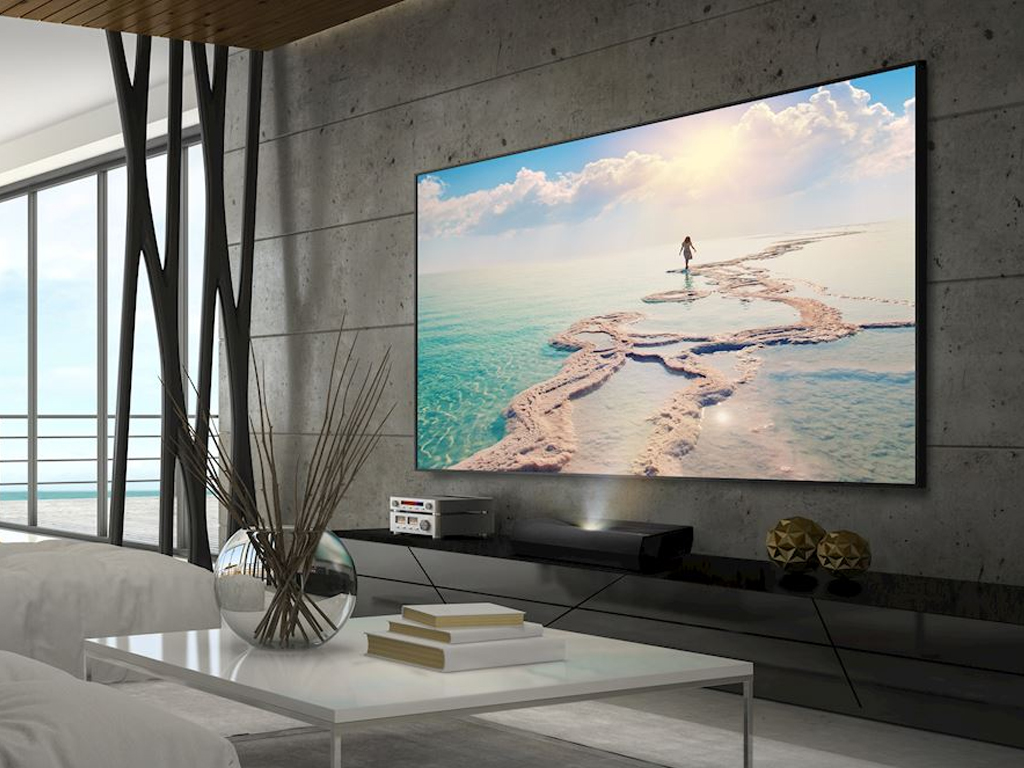
Spend time reading any literature on projectors and you’ll be bombarded by acronyms.
In terms of how they work you’ll be confronted by LED, LCD and DLP. Considering brightness, you may be puzzled by projector lumens. (Just how bright is a lumen?) And finally, you’ll have to decide on resolution; the general rule of thumb being that the bigger your cinema screen, the higher the resolution needed.
Of course, that’s not including the physical dimensions of the projector installation itself. For instance, do you need an ultra short throw projector (and what is one, anyway?)
But really, how to choose a projector comes down to needing to know just one fact – that our experts at TVC can guide you through this jungle of acronyms and terms to deliver you a system with the best projector for your needs.
There are two types of projector – DLP and LCD, and they may use a bulb, an LED or a laser as a light source. More recent models that use a bright LED light source are often called LED projectors. Both DLP and LCD projectors have their own advantages and disadvantages.
DLP stands for digital light processing. A DLP projector uses a digital micromirror device that consists of tiny mirrors on the chip’s surface that reflect light according to the video picture. This is then focused and projected. The majority of commercially-operated cinema projectors are DLP.
An LCD projector uses a liquid crystal display to create the image (rather like an LCD TV) which is projected using either a bulb or an LED. This is more recent innovation and normally LCD projectors are more suitable for smaller installations as they often have lower brightness; on the other hand, they are far more cost-effective.
Another factor to bear in mind is maintenance. Bulbs used in some cost-effective projectors require changing after a period of time, which you should offset against their lower price against a projector featuring a LED or laser light source.
Depending on your intended installation and amount of use, TVC can advise on DLP vs LCD technology to suit your budget.
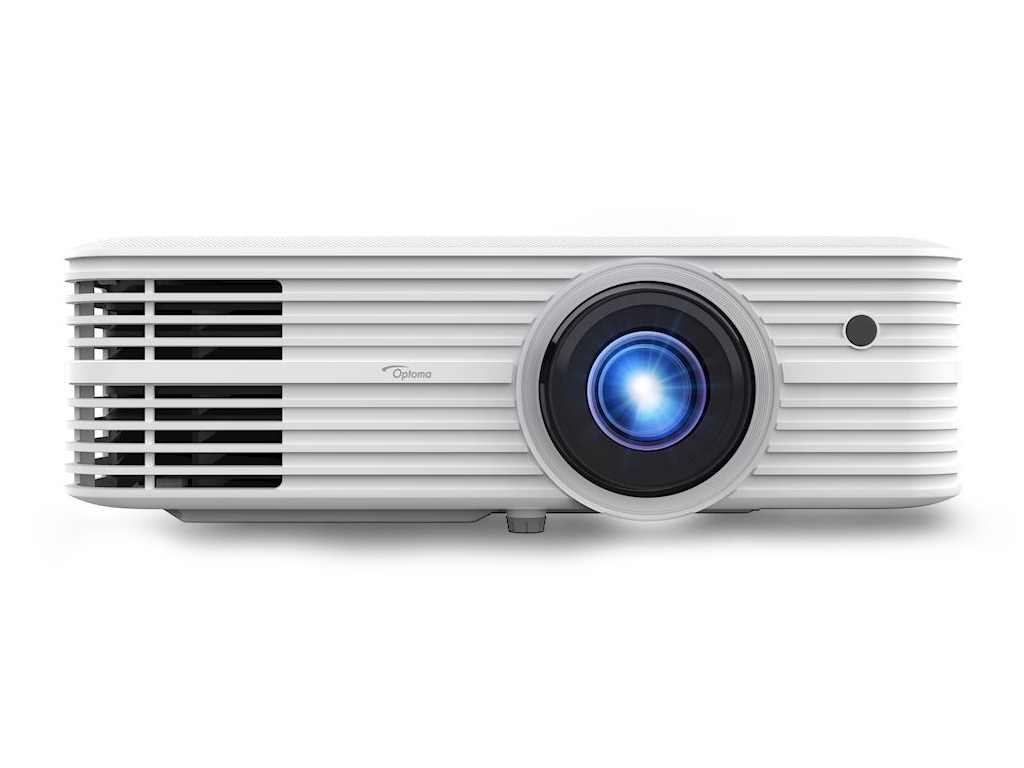
Projector lumens are basically a measure of the projector’s brightness. Ask how many lumens do I need and the answer is – it depends! There are a few factors to consider: The type of environment, the size of the screen and the ambient light levels.
For dedicated sit-down viewing – for instance a projector in a home theatre where the light can be controlled – you actually don’t need as much projector brightness as a hospitality or business venue where screens tend to be bigger and ambient light levels can be higher – or variable.
Put it this way – 1500 lumens is only about as bright as a regular lightbulb. For any sort of good viewable picture, a 5000 lumen projector is really where you should start, although there are some budget models rated between 3000 and 4500 lumens that are acceptable for occasional use.
So rather than ask how many lumens, let TVC recommend the ideal projector for your location and budget.

It makes sense to try and use the highest projector resolution you can afford – even if all your source material is not originated in that standard. This is because you should future-proof your installation as well as reducing visible ‘blockiness’ as much as possible – something that’s all too easy to see on legacy resolutions like XGA and WXGA, which are less than full HD.
Ideally go for a 4K projector using a suitable 4K projector screen, as it’s now quite easy to upscale source material from other formats to 4K. However not everyone has that sort of budget so consider a ‘native’ 1080p projector as a minimum standard. But check specs carefully – even for something that’s referred to as full HD. Or just leave the specifying to us at TVC, as we know the market and the manufacturers of choice.
You can entrust TVC to deliver you a great installation for any projectors or projector screens. We consider all aspects of connectivity from pop-up mains outlets to customised panels with inputs and outputs for audio and video.
As part of your projector installation, we can also specify and install wireless solutions to remotely control everything including brightness, sound level and ambient lighting.
Finally we’ll arrange projector set-up of the whole system and if required, offer your staff training on its operation.
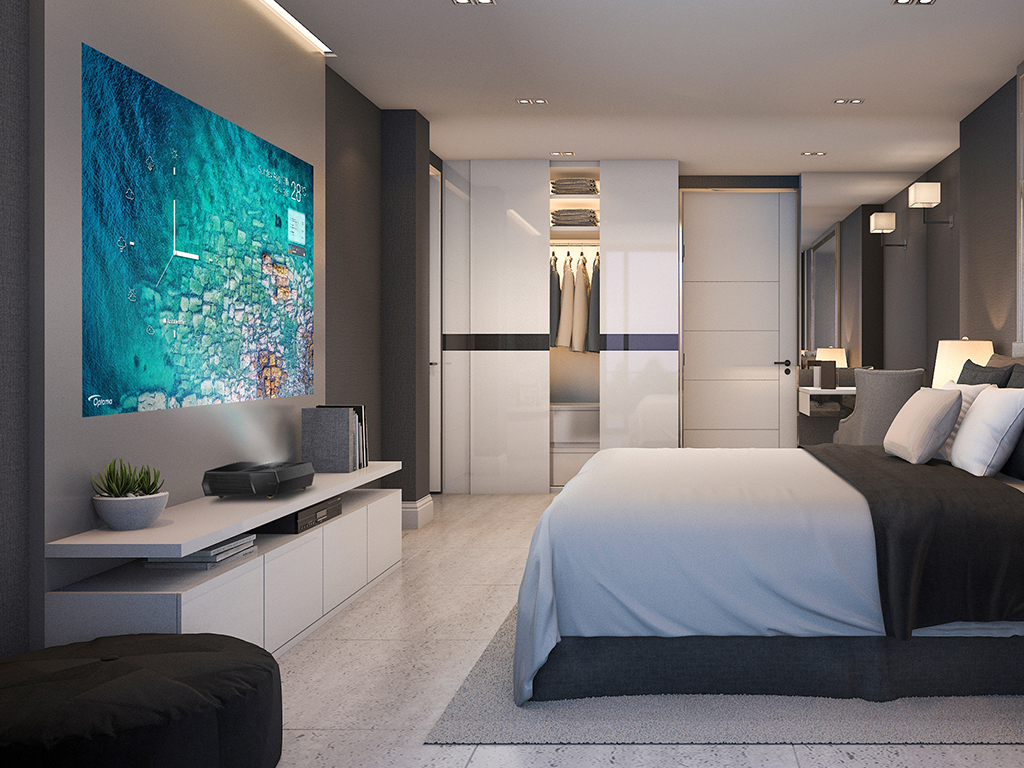
It’s important to specify the right projector for your intended use. For instance, a good home cinema projector will have different features to a heavy-duty projector running constantly in a retail environment. We’d always recommend a 1080p projector as a minimum spec to consider, but bear in mind that there are many different types of HD projector. So for an outdoor projector, an LED projector or for something more specialised, talk to TVC – the AV specialists.
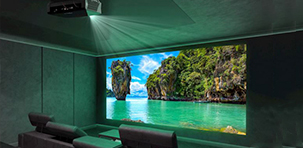
A home cinema projector often has specific requirements. It needs to be quiet in operation as well as small and neat in appearance (especially if it isn’t hidden away when not in use.)
Home projectors also need great sound to compliment them and we’d also recommend any home cinema is equipped with a high-quality home projector screen which will definitely increase viewing pleasure.
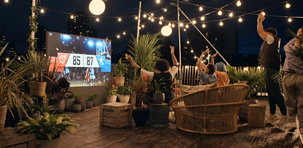
Particularly recently, pub gardens have become more important with people being more comfortable outside. Many customers are setting up systems with an outdoor projector.
Night-time viewing means projector brightness is not so critical but equally a robust outdoor projector screen is a must; the merest hint of breeze will threaten many cheaper ones.
As well as brightness, another factor to consider is connectivity; specifying a wireless projector means it’s possible to stream movies from your tablet or phone.
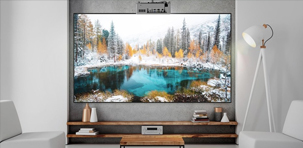
At TVC we will specify you a 1080p projector as a minimum standard.
A full HD projector (one that projects full HD) is a cost-effective solution to many installations and with the availability of the ultra short throw projector at affordable prices, full HD pictures are possible in many more installations.
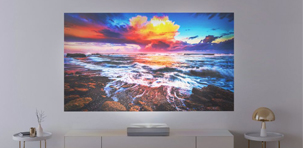
A short throw projector (or an ultra short throw projector) allows you to place the projector closer to the screen and still get a big wide picture. Often incorporated into a small projector, this is made possible by a combination of optical techniques and advances in correction technology – both of which are required for a properly-proportioned and impressive picture on screen.
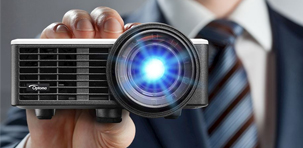
An LED projector minimises routine maintenance as there is no expensive bulb to change and re-calibration is not usually required.
A 4k projector with an LED light source using LCD technology has very few moving parts and will therefore be inherently more reliable – it’s a popular choice.
For advice on every projector, talk to TVC.
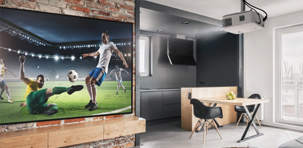
A DLP projector offers a great quality picture and is often available in 4K as well as HD. DLP (or digital light processing) projectors are used in many commercial applications.
For the relative benefits of DLP vs LCD, see the section near the top of this page – or talk to TVC – we’re the experts!
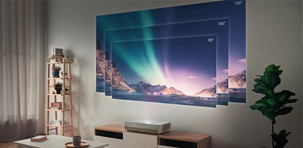
When large screens need to be illuminated for commercial applications – like in a public cinema, DLP projectors incorporating laser technology as the light source are used.
Worldwide, they are recognized as the best projector, with the brightest outputs and the most accurate colour rendition. Resolutions up to 8K are available – although they’re not cheap!
For more information on any laser projector and screen set-ups, please call TVC.
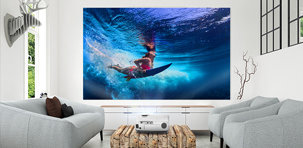
For the ultimate convenience in business meetings or at home, a Bluetooth projector is really useful. Especially when you have a ceiling projector or a wall-mounted projector, being able to hook up wirelessly is great, and no more searching for cables, either.
So consider specifying a wireless projector for your next installation; it’ll pay you back in usefulness many times over.
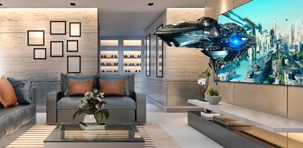
There is still a market for 3D projectors in home cinema and specialist CAD/CAM installations and TVC are able to specify and install the right 3D projector for your application.
In a home theatre set up, you’d normally use a ceiling projector mounted as close to inline with the screen as possible to reduce registration issues.
A high quality projector screen can make all the difference between a good show and a great one. Many specialist screens will actually make your projectors appear brighter due to their reflective properties, so they definitely outperform the average wall.
At TVC we can install and specify all types: a cinema screen, a pull down projector screen, an electric projector screen – even a screen for an outdoor projector.
Here’s our brief guide to the best in screens, and don’t forget, TVC have all the info you need and can specify, plan and install any system utilising projector screens.
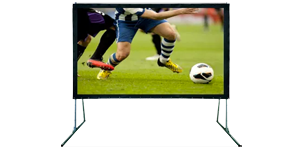
Whether it’s permanent or you bring it out for the summer, your outdoor projector screen needs to be robust and weatherproof and ensures there’s sufficient brightness as well. A particular problem in the UK is wind and we recommend a permanent installation in a sheltered position to avoid this issue.
As we’ve mentioned above, projector brightness isn’t a major issue as mostly you’ll be using it when it’s dark. Also, always ensure your outdoor projector is sufficiently protected – both physically and electrically – before using outside.
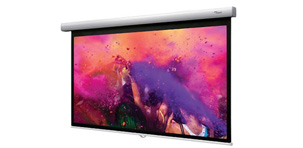
Although a pull down projector screen may remind you of school or college, they’re actually a really useful way of storing a screen and keeping it clean and out of the way when not in use.
Especially in conjunction with a ceiling projector, a pull down screen means the room can be reassigned to other purposes very quickly, with nothing to clear up.
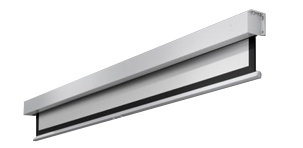
Where your projector screen is quite large, we think that an electric projector screen is very useful. It also adds a touch of glamour to any presentation if you can deploy a motorised projection screen at the touch of a button.
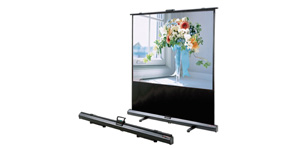
For the ultimate in portability, a pull-up projector screen can be deployed in a very short period of time and offers a stable screen, suitable for smaller meetings and seminars. Inevitably, they’re for indoors only and this type of projector screen should only be considered for temporary use.
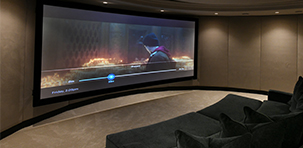
To go with your home cinema projector we recommend you choose a good quality home cinema projection screen as it will greatly improve your viewing. Also consider a motorised projection screen for a touch of Hollywood glamour.
At TVC we sell the big projector brands that we know and trust – the same brands that we specify for other parts of an AV system; components that we know will deliver excellent performance and years of reliable service. If you’re looking for the best projector and screen system or just the best projector, we stock Epson, NEC, Canon and Optoma.
And remember, at TVC we are the AV system specialists. For your next system specification, supply and installation contact us today.
Get in touch with our friendly team using our handy contact form below...